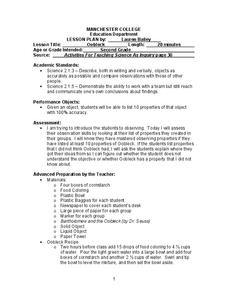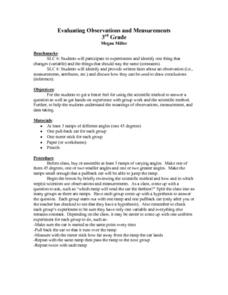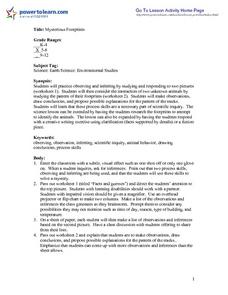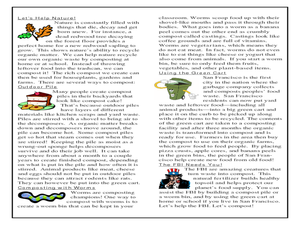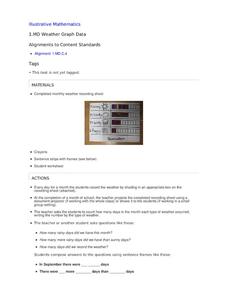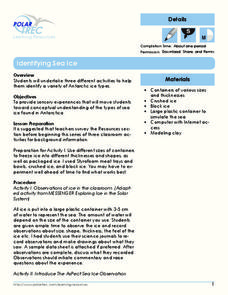Curated OER
Oobleck
Second graders observe the properties of Oobleck. In this science and observation instructional activity, 2nd graders examine Oobleck and make a list of 10 properties that they notice. They explain their observations.
Curated OER
Insect Anatomy
Young scholars explore the anatomy of an insect. In this activity the characteristics of insects, students explore parts of an insect. Young scholars gain knowledge through pictures and charts showing insects and their body parts....
Curated OER
Observation And Listening Skills
First graders read a story about polar bears and make observations as they read. In this observations lesson plan, 1st graders listen carefully and sing a bear chant.
Curated OER
I Wonder What An Important Observation Is...
Middle schoolers discover the importance of descriptions and detail in their writing. They write in their scientific journals and are evaluated by the teacher. They write a descriptive piece and evaluate their own writing as well.
Curated OER
Time-Lapsed Observations
Students explore timed observations for science investigations. They record ideas on a chart related to a classroom closed terrarium. They repeat their observations for several days and time observations for changing shadows during the...
Curated OER
Outdoor Observation
Students examine their outside environment. They use their senses to make observations of the four seasons. They keep a chart of all of the data they have collected.
Curated OER
Evaluating Observations and Measurements
Third graders review the scientific method and how and in which steps scientists use observations and measurements. Then as a class, they hypothesize which ramp will send the car the farthest. They break into groups and send cars down a...
Curated OER
Mysterious Footprints
Students, after observing and responding to two pictures, consider the interaction of two unknown animals by examining the pattern of their footprints. They make observations, draw conclusions and propose possible explanations for the...
Curated OER
A Room Full of Colors and Shapes
Students explore their new classroom with this hunting and matching game. In this early childhood problem solving lesson plan, students use observation and matching skills as they hunt for pre-cut shapes around the classroom.
Curated OER
REDOX Lab
Students produce copper metal by electrolysis. In this REDOX lesson plan, students use a copper (II) chloride solution and a 9 volt battery to produce copper metal through an electrolysis reaction. Students make observations and take...
Curated OER
Polymers Lab: Bouncy Ball and Slime
Eighth graders investigate chemical reactions to produce polymers. In this polymers lesson plan, 8th graders experiment with sodium silicate and ethyl alcohol to make a polymer. They also experiment with borax and glue to make a polymer....
Curated OER
Beanie Baby
Students will explain the importance of soybeans. In this science lesson, students participate in making a "beanie baby" necklace. Additionally, students observe their soybeans for germination and growth for 7-10 days. Students record...
Curated OER
Fossils
Fifth graders study the characteristics of fossils. They create a chart comparing the different fossil size, shape and texture. Students make observations and describe fossil characteristics in journals.
Curated OER
Interview Exclusive! Paris-Match interroge Audrey Tatou, vedette du film, Le fableux destin d'Am¿¿lie Poulain
Young scholars role play an interview. After researching Audrey Tautou and the movie Amelie, pairs of students take turns interviewing each other. One plays the role of a journalist and the other plays the role of an actress. During the...
Curated OER
Hydrogen-Electrolysis of Water
Students discover how hydrogen is created and extracted from water to use as an energy source. In this solar energy lesson, students use pieces of aluminum foil as electrodes. Students attach one end of a wire to the hanger of the...
Curated OER
Let's Build a Worm Bin
Students explore the process of decomposition. In this ecology and measurement lesson, students prepare a worm home to be used for vermicomposting. Students weigh a group of worms and the added food, recording this information on a data...
Illustrative Mathematics
Weather Graph Data
Teaching young mathematicians about collecting and analyzing data allows for a variety of fun and engaging activities. Here, children observe the weather every day for a month, recording their observations in the form of a bar graph....
Cornell University
Nano What?
The size of a nanoparticle is difficult for pupils to grasp. A hands-on experiment is designed to give your classes perspective. Learners analyze different sports drinks for the content of electrolytes as an introduction to nanoscale....
Curated OER
Connect the Spheres: Earth Systems Interactions
Is everything really connected? Take your class on a walk outside, where they will make observations and write them down on a worksheet. Once they are back in the classroom, learners will work to determine if and how things like birds,...
Pinecrest Preparatory Middle and High School
Touching Spirit Bear: Final Novel Project
Close up your study of Touching Spirit Bear with any of these assessment options. Each of the four project options is described in detail. Also included is a page that learners can use to portion out their time to make sure they fulfill...
Polar Trec
Identifying Sea Ice
Sea ice contains 17 sub-types based on age and various characteristics. Scholars observe ice floating in a simulated ocean and record their observations. Then, they view photographs of different types of sea ice and learn to...
Baylor College
What's Is Soil Made Of?
It's time to roll up those sleeves and get a little dirty in the second instructional activity of this series on the science of food. Investigate where plants and animals get the minerals they need to live in this two-part exploration of...
Curated OER
Layer Cake Archaeology
Excavating cake? Why not! Kids spoon into some layers and artifacts during this tasty hands-on activity. The cake, a simulated archaeological dig, is the object of observation and discussion.
Baylor College
Fungus Among Us
In order to learn that mold spores can be found in the air, observers grow bread mold and make observations for a few days. Afterward, they participate in a class discussion to arrive at the knowledge that bread spores are present in the...


